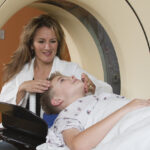Multinational study finds alarming link between CT scans in youths and cancer risks
 (NaturalHealth365) Repeated X-rays are widely acknowledged to subject the human body to potentially harmful radiation levels. However, a lesser-known fact is that CT scans (computed tomography) also pose a hidden risk of radiation exposure.
(NaturalHealth365) Repeated X-rays are widely acknowledged to subject the human body to potentially harmful radiation levels. However, a lesser-known fact is that CT scans (computed tomography) also pose a hidden risk of radiation exposure.
CT scans can expose individuals to radiation doses that are as much as 200 times greater than those from a typical chest X-ray. Astonishingly, only a few people are aware of this substantial difference in radiation exposure. It is crucial to emphasize that, according to the National Academy of Sciences, there are no safe doses of radiation.
In fact, a multinational study published in Nature Medicine highlights an alarming link between CT scans during one’s youth and the subsequent development of cancer.
Large study puts a spotlight on shocking reality of pediatric CT scans
Like X-rays, CT scans utilize diagnostic imaging procedures that blend x-ray and computer technologies to generate detailed images of the human body. While CT scans offer a comprehensive view of organs, muscles, fat, bones, and blood vessels, the study above reveals an underlying threat to youngsters.
A thorough examination of the study reveals a legitimate connection between youth CT scans and cancer, specifically hematological malignancies – cancers that develop within immune system cells or blood-forming tissues like bone marrow.
The researchers reached this conclusion after evaluating the health of 948,174 individuals who underwent CT scans before turning 22, spanning nine European nations. Extrapolating the results indicates that, for every 10,000 kids examined, between one and two may develop or have already developed hematological malignancies due to radiation exposure.
The study’s key takeaway is the higher-than-expected cancer risk, even with low doses of radiation.
Advocating for informed decision-making: A parent’s guide
Considering this alarming risk of increased cancer development, parents should meticulously assess the risks and benefits before subjecting their children to diagnostic imaging procedures using ionizing radiation.
Do not be afraid to push back and ask if the scan is medically necessary. Arm yourself with information by presenting key facts to your doctor, encouraging an informed and productive discourse.
Advocating for informed decision-making: A parent’s guide
Parents play a crucial role in ensuring their children undergo imaging tests only when absolutely necessary. Here are practical tips to navigate this crucial decision-making process:
Engage in an open dialogue with healthcare professionals.
Seek answers to key questions:
- Does this test involve radiation?
- Is this test absolutely necessary?
- Do the benefits of the procedure outweigh the risks?
- Are there non-ionizing alternatives, such as ultrasound?
Maintain a detailed record of each imaging scan.
Note the location and date of each procedure. Keeping a copy of the scan is essential to prevent unnecessary repetitions, especially when seeking medical care from multiple providers.
Pay careful attention to dental X-rays during routine check-ups.
As a parent, you have the right to make informed decisions about the frequency of dental X-rays for your children rather than being bound by predetermined guidelines. While dental check-ups may include recommendations for bitewing X-rays, especially for children with cavities, you should assert your preferences.
If pressured to adhere strictly to suggested intervals, it might be worth considering a consultation with a biological dentist who may provide alternative perspectives on the necessity and frequency of X-ray procedures based on individual health considerations.
Sources for this article include:
Nature.com
Sciencedaily.com
FDA.gov
Webmd.com
NAP.nationalacademies.org



